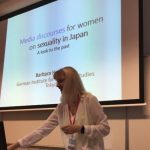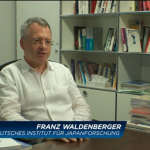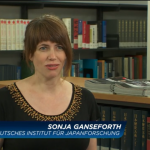Events and Activities
The DIJ at this year’s ICAS 11
At this year’s ICAS 11 conference in Leiden, Netherlands, the DIJ was represented by papers given by Barbara Holthus, Hanno Jentzsch, and Nora Kottmann. The Max-Weber Foundation also featured a book table, with numerous publications by the DIJ on display.
For more on this, see this report (in German).
The DIJ travels to the ICAS conference in Leiden
The DIJ travels to Leiden. The ICAS conference is held July 10 to 15 in Leiden, the Netherlands. More than 2000 scholars are expected to present their research.
The DIJ is represented through Barbara Holthus, Hanno Jentzsch and Nora Kottmann. Nora is the organizer of the panel on (No) Sex in the City, in which she and Barbara present their research. Hanno will present his paper on Governing the Man-Made Disaster – Revitalizing Local Governance in Japan’s Peripheries.
Detailed information on the breadth of the DIJ research activities and publications is available at the Max Weber Foundation exhibition table in the book exhibit hall. Please come see us there!
Looking forward to seeing many of you in Leiden!
DIJ in Austrian TV report “Olympia 2020: Adventure Tokyo”
Franz Waldenberger, Barbara Holthus, and Sonja Ganseforth appeared in an Austrian TV report on the 2020 Tokyo Olympics. They provided expert commentary on Japan’s Olympic legacy desires, anti-Olympic protests, and the Olympic agenda on diversity. The report was broadcast by the Austrian public TV station ORF during their flagship sports program “Sunday Sports” (in German) on June 16th.
The DIJ currently prepares a book covering a wide range of topics related to the Tokyo Olympics. Its tentative title is “Japan through the lens of the Tokyo Olympics” and it is due to be published in January 2020.
EU project partnership: „ACCESS – Supporting Digital Literacy and Appropriation of ICT by Older People“
The DIJ Tokyo is partner with the multi-disciplinary and transnational EU project “ACCESS – Supporting Digital Literacy and Appropriation of ICT by Older People”, which is coordinated by Professor Claudia Müller of the University of Siegen. Goals are to explore and evaluate ways for elderly people to learn the usage of modern ICT solutions that promise a better social participation and an overall improvement of the quality of life. The DIJ is responsible for the project’s Japan-related research.
Memorandum of Understanding with the Institut français de recherche sur le Japon à la Maison franco-japonaise
The DIJ and the Institut français de recherche sur le Japon à la Maison franco-japonaise concluded a Memorandum of Understanding in which both institutions agreed upon closer exchanges in the areas of socio-scientific and humanistic Japanese Studies. The Memorandum of Understanding places particular emphasis on developing and expanding the potential of joint research and events.
Report on the Transregional Academy „Infrastructures, Regions and Urbanizations“
The Berlin-based Forum Transregionale Studien and the Max Weber Stiftung – Deutsche Geisteswissenschaftliche Institute im Ausland had invited 18 doctoral and postdoctoral scholars from the humanities and social sciences to attend a Transregional Academy convened at the National University of Singapore (NUS) on the topic of “Infrastructures, Regions and Urbanizations”. The Academy was chaired by Weiqiang Lin and James D. Sidaway (National University of Singapore), Franz Waldenberger (Deutsches Institut für Japanstudien, Tokyo) and Simone Lässig (Deutsches Historisches Institut Washington). It was arranged in cooperation with the Asia Research Institute and its director Jonathan Rigg as well as the Max Weber Foundation Research Group on Borders, Mobility and New Infrastructures at NUS.
Read the full report by Franz Waldenberger
Join the DIJ as Post-Doctoral Research Fellow
 We are seeking applicants to fill a project position planned to start on 1 March 2019 for a Post-Doctoral Research Fellow.
We are seeking applicants to fill a project position planned to start on 1 March 2019 for a Post-Doctoral Research Fellow.
The position will form part of the project “Streams of Knowledge: Processes of Entanglement and Disentanglement in the Pacific Area.” This is a joint project carried out in cooperation with the German Historical Institutes in Moscow and Washington, their branch offices in Vladivostok and Berkeley, and the MWS Research Group at the National University of Singapore.
Monumenta Nipponica 80th Anniversary Symposium: Roundtable
Deputy Director Barbara Holthus introduces the DIJ at the Monumenta Nipponica 80th Anniversary Symposium:
The event’s full video playlist is available on YouTube.












 Open Access
Open Access
